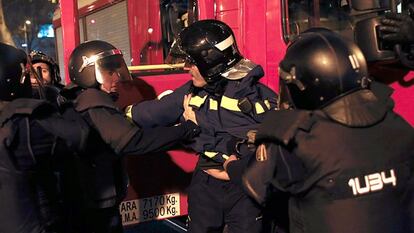Support for Burgos rebels spreads to other Spanish cities
Arrests in Madrid as 500 gather to defend residents protesting controversial street remodeling project Events planned for 48 other locations across the country

More than 500 people gathered in downtown Madrid on Wednesday to show their support for protests in Gamonal, a working-class neighborhood in the northern city of Burgos where residents have managed to temporarily halt a controversial street remodeling project.
“We are all Gamonal!” and “Freedom for prisoners in jail for fighting!” were the most widely chanted slogans at the demonstration in central Puerta del Sol square, the same place where the 15-M popular-protest movement began in May 2011.
The demonstrations were organized through the social networks, with further events set to be held simultaneously in 48 other Spanish locations, including Ciudad Real, Logroño, Oviedo, Seville, Valladolid and Gijón.
For many Spaniards, Gamonal has become a symbol of resistance. And for now at least, the man on the street appears to be winning. Following five straight days of street protests last week – which included violent rioting on Friday and Saturday that resulted in 40 arrests – Burgos Mayor Javier Lacalle, of the conservative Popular Party (PP), announced a freeze on a project to convert Vitoria street into a boulevard with a cycle path, fewer car lanes and fewer parking spots. Residents claim the eight-million-euro project is useless and are instead demanding more social services for a neighborhood hit hard by unemployment.
What’s going on in Burgos is shameless speculation”
“What’s going on in Burgos is shameless speculation,” said Ángel Sarti, 71, a “rebel since I was born” and one of the leaders of the Madrid gathering. His chanting, though amplified by the loudspeaker he was carrying, was at times dampened by the sound of the police helicopter hovering overhead.
And that was precisely one of the other reasons for the Madrid protest: the recent Citizens Safety Law that many see as the government’s attempt to crack down on public protesting and whose content “goes way beyond [what is permissible in] a rule of law,” said one demonstrator.
“It is outrageous, the way the Popular Party (PP) is criminalizing social protest,” said Diego Parejo, a twentysomething member of the Autónoma University Student Union. “We condemn the PP’s brutal repression of workers and youth in a neighborhood that came out to defend its rights.”
Some Madrid protestors walked over to the headquarters of the ruling PP, on Génova street, where they clashed with the police after hurling firecrackers at them, burning a trash container and turning over several more. Fourteen people were arrested, including three juveniles and one firefighter, Europa Press reported.
Several youth groups were present at the Sol gathering, most notably communist associations. Some of these carried posters that said “Gamonal, the spark that starts the revolution.”
The consensus view among the clusters of people discussing the situation was that what is happening in Gamonal could happen again in many other Spanish cities. “If it hadn’t been Gamonal, it could have been Cuenca or Alcorcón,” said N.F.C., a man in his thirties who is a member of the CNT, an anarchist labor union federation. “This situation is about to blow apart because of unemployment and poverty... It’s all part of the same thing, the precarious jobs and a voracious crisis.”
Standing next to him, another CNT member, who had come from Toledo to join the demonstration, said Gamonal was an example of how “the spark had to ignite somewhere.”
Tu suscripción se está usando en otro dispositivo
¿Quieres añadir otro usuario a tu suscripción?
Si continúas leyendo en este dispositivo, no se podrá leer en el otro.
FlechaTu suscripción se está usando en otro dispositivo y solo puedes acceder a EL PAÍS desde un dispositivo a la vez.
Si quieres compartir tu cuenta, cambia tu suscripción a la modalidad Premium, así podrás añadir otro usuario. Cada uno accederá con su propia cuenta de email, lo que os permitirá personalizar vuestra experiencia en EL PAÍS.
¿Tienes una suscripción de empresa? Accede aquí para contratar más cuentas.
En el caso de no saber quién está usando tu cuenta, te recomendamos cambiar tu contraseña aquí.
Si decides continuar compartiendo tu cuenta, este mensaje se mostrará en tu dispositivo y en el de la otra persona que está usando tu cuenta de forma indefinida, afectando a tu experiencia de lectura. Puedes consultar aquí los términos y condiciones de la suscripción digital.









































